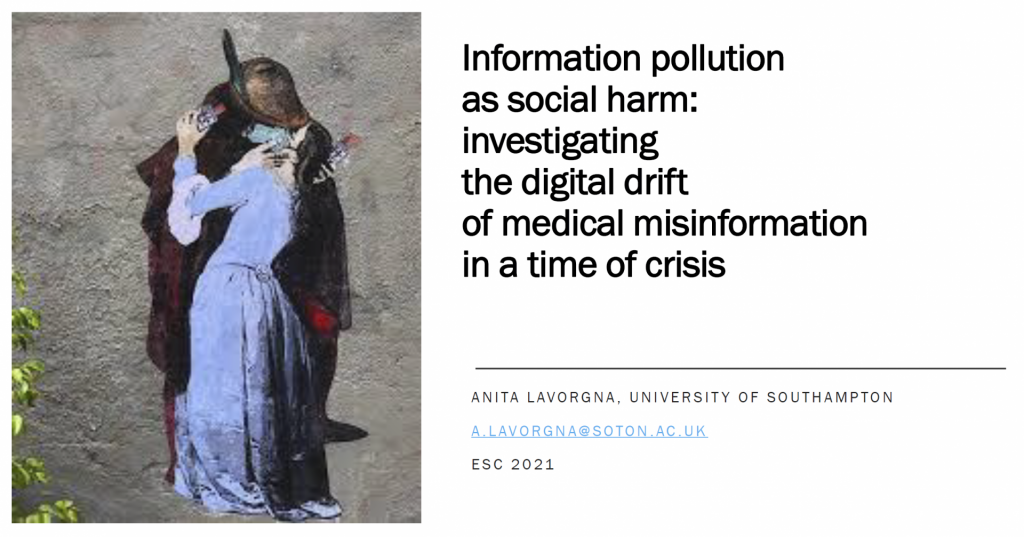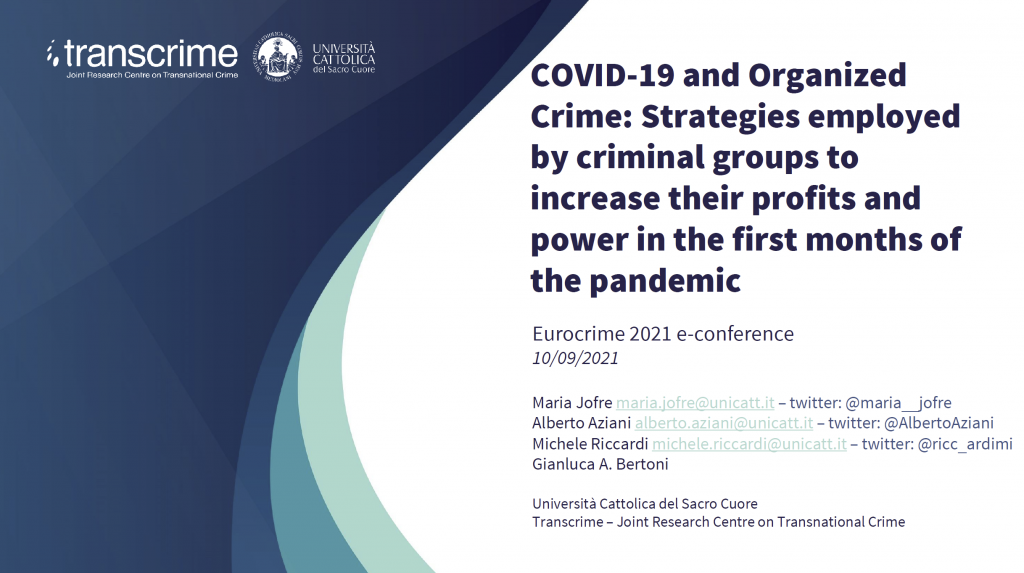The ESC 21st annual conference took place online from 8 to 10 September 2021. During these days, we have seen that the health situation we have been experiencing for more than a year has raised many questions in criminological research. It was most interesting to hear about the research perspectives of the 50 papers related to the Covid-19 pandemic that have been presented.
Discover here the presentations of the working group members

The coronavirus pandemic struck the world in a very distinctive way: experience from past pandemics or from more recent outbreaks could give us only a limited understanding of how the situation was likely to unfold. In this context, and with cyberspace being increasingly used to support health-related decision making and to market health products, potentially harmful behaviours have been carried out by individuals propagating non-science-based health (mis)information and conspiratorial thinking. This includes, among other actions, boycotting the use of masks and physical distancing, proactively opposing the use of the COVID-19 candidate vaccines, and promoting the use of useless or even dangerous substances to prevent or resist the virus. By relying on a virtual ethnography approach carried out on Italian-speaking alternative lifestyle and counter-information online communities, this presentation, based on a recently published book, shows how the nature of personal interactions online and the construction of both personal and group identities through the development of an ‘us vs. them’ narrative, are central to the creation and propagation of medical misinformation.

COVID-19 has created new opportunities for OCGs and confronted them with new challenges. Analysis of how these groups have reacted to the pandemic yields better understanding of how they work and enables the devising of more effective counter-strategies. To this end, we identified illustrative cases regarding the provision of illegal governance and infiltration of the legal economy by conducting a systematic content analysis of international media articles and institutional reports published during the first eight months of the pandemic. These cases were further analyzed in order to cluster the behavior of criminal groups in response to the COVID-19 emergency, and the means by which they tried to exploit the pandemic to strengthen their political and economic power. We found that different governance-type criminal groups proposed themselves as institutions able to mitigate the burdens imposed by the pandemic by providing support to people in need and enforcing social-distancing measures. Further, identified cases did not provide evidence of groups devoted to the provision of illicit services and goods assuming any governance role. Cases of misappropriation of public funds and OC infiltration of the legal economy seem less common. The wholesale distribution of pharmaceuticals and medicines has been the sector targeted the most.

Since 2020, the COVID-19 pandemic and government measures to limit its spread have had a huge impact on society. Crime opportunities and criminal justice systems have also been affected by this health crisis. With the aim of international collaboration, a working group has been created to promote research among European researchers and thereby facilitate the exchange of information and comparative studies on the impact of Covid-19 on crime and criminal justice systems. Thus, in order to get an overview of the academic publishing, the School of Criminal Justice of the University of Lausanne has undertaken a preliminary review of publications released on crime trends and police activity during Covid-19 pandemics. The aim of this research is to identify all the manuscripts published between February 2020 and June 2021 in English in order to review the research questions, the data used, the analytical strategies and the results. In total, the keywords chosen were able to identify 126 manuscripts.

Since the arrival of the coronavirus pandemic, criminologists monitored the impacts of the pandemic on crime and criminal justice, nonetheless, precarious and hard-to-reach populations have been understudied thus far. This exploratory study sheds light on the impacts of the first year of coronavirus on sex workers (SW) in Switzerland, a country where prostitution is legal. Based on 40 surveys with outdoors and indoors SW and 50 hours of observation on the field, our findings suggest that SW were negatively impacted by the pandemic. Seventeen SW were victims of at least one work-related offence since the pandemic started, the most prevalent being theft and frauds. Nevertheless, most SW did not report the incidents to the police. Comparing the no-victims with the victims, we found that the victims, and especially the multi-victims, are younger, in higher proportion foreigners from extra-EU countries, in an illegal situation, and needed to work face-to-face during the prostitution ban during the lockdown in Switzerland. Most SW do not use illegal drugs, and only few of them used more during the pandemic. Our research goes in similar direction as former studies, although we could infer that the violent victimisation of our sample is lesser, and the police violence has not been highlighted by any of the SW. We nevertheless have no point of comparison with former years, reason why we propose a periodical crime victim survey towards the SW, as well as further prevention measures in the prostitution area.

Since 2020, the COVID-19 pandemic and government measures to limit its spread have had a huge impact on society. Crime opportunities and criminal justice systems have also been affected by this health crisis. With the aim of international collaboration, a working group has been created to promote research among European researchers and thereby facilitate the exchange of information and comparative studies on the impact of COVID-19 on crime and criminal justice systems. Thus, the School of Criminal Justice of the University of Lausanne has undertaken a mapping of the ongoing projects related to COVID-19. The aim of this research is to identify, using different keywords, all current projects carried out in English, French, German, Spanish or Portuguese. To be selected, the project had to (1) focus on the impact of COVID-19 on different areas of criminology, (2) be carried out in one of the five languages mentioned, and (3) be conducted by a legitimate research organization. Our results highlight the research question, the time periods and geographical areas covered, and the methodologies used. In total, the keywords chosen were able to report on 66 projects in progress in various fields of criminology, such as prisons, policing, domestic violence or cybercrime.